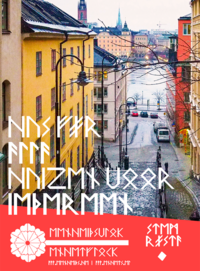Social Democrats (Hellona)
Social Democrats ᛖᛖᚾᚻᛖᛁᚦᛋVᛚᛟK ᛖᚾᚻᛖᛏᚠᛚᛟCK | |
|---|---|
 | |
| Leader | Hilda Storfjällen |
| Founded | 1836 |
| Split from | Workers' Party of Hellona |
| Headquarters | 24 Rijksdaglaan, Owidal |
| Youth wing | Social Youth Alliance |
| Membership (1910) | 2.1 million |
| Ideology | Social democracy, democratic socialism |
| International affiliation | Social Democratic Alliance of the Trident |
| Position | Left-wing |
| Colours | Light red |
| People's Council | 139 / 451
|
| Higher Council | 25 / 101
|
| Election symbol | |
| Rose | |
The Social Democrats of Hellona (Hellonian: Eenheidsvlok, Ellashian: Enhetsflock; both literally meaning unity/equality party) though also known as Sociaaldemokraten or Socialdemokraterna; is the largest and one of the oldest political parties of Hellona. The current leader of the party is Hilda Storfjällen, who has also been Great-minister of Hellona since 1910. The party has been the leading political parties in Hellona since the 18th century.
The party was founded in 1799, when the Workers' Party of Hellona was split into the Communist Party, the Labour Party and the Social Democrats. Great Ministers of the Social Democrats were Stefan Drees and Hilda Storfjällen.
History
While traditional Liberal parties were the leading parties in early modern Hellonian history, the horrid working conditions during the early industralisation of Hellona led to the rise of Socialist, Communist and other leftist organisations and parties. In 1799 the Workers' Party of Hellona was created, which later split into the Social Democrats, the Communist Party (now the People's Party) and the lesser-known Hellonian Labour Party. It grew in importance until 1840, when the Social Democrats formed their first government. Since then it has been a leading party in Hellonian politics.
While originally set up as a Leftist coalition including Communists and Anarchists, their influence slowly decreased leading to the breakup of the Workers' Party.
It now leads the Social Alliance in government, forming a political alliance with GREEN, the People's Party and Centre.
Ideology
Starting out as democratic socialist party, slowly moving to a more moderate social democratic stance; the party's statute still stresses the wish to move to "A society with an economy and culture based on the democratic principles our country holds dear. From each according to his ability, to each according to his need." After becoming a major player in the Rijksdag and leading several cabinets, it has influenced the political and social landscape of Hellona in several ways. As a socialist party it greatly contributed to the Hellonian labour movement and the subsequent class emancipation. It also led the temperance movement to great succes. Even though the party slowly become more centrist throughout the years, it still holds the socialist principle of widespread and individual human development and equality high.
The party led the movements to reduce the power of the monarch, and officially in acordance with King Kristoffer, abolished the Tri-Head system in Hellona during his coronation. It has also supported the nationalisation and municipalisation of all public transport and several other companies, such as Statolie (Now private with the Hellonian state being the largest shareholder).
Social democracy
The party is known for creating the contemporary progressive taxation, and encouraging low-unemployment and fair trade. These made way for creating the full welfare state, finalised after the Great Trident War and expanded throughout the years.
The party supports social welfare provision paid for by progressive taxation. The party also supports a social corporatist economy involving the institutionalization of a social partnership system between capital and labour economic interest groups, with government oversight to resolve disputes between the two factions. In recent times, they have become strong supporters of egalitarianism, and maintain a strong opposition to discrimination and racism.
Electoral History
| Election | Votes | Seats | Win | Outcome | ||
|---|---|---|---|---|---|---|
| # | % | # | ± | |||
| 1836 | 60 / 451
|
Opposition | ||||
| 1840 | 89 / 451
|
Senior partner in coalition with Centre, the Democrats and the Communist Party. | ||||
| 1844 | 111 / 451
|
Senior partner in coalition with Centre and the Democrats | ||||
| 1848 | 90 / 451
|
Opposition | ||||
| 1852 | 150 / 451
|
Crisis government with the People's Party, Centre and the Democrats | ||||
| 1856 | 240 / 451
|
Majority crisis government | ||||
| 1860 | 181 / 451
|
Senior partner in coalition with the People's Party | ||||
| 1864 | 206 / 451
|
Senior partner in coalition with the People's Party | ||||
| 1868 | 189 / 451
|
Opposition | ||||
| 1872 | 171 / 451
|
Opposition | ||||
| 1876 | 117 / 451
|
Opposition | ||||
| 1880 | 121 / 451
|
Senior partner in coalition with the People's Party and New Left | ||||
| 1884 | 166 / 451
|
Senior partner in coalition with the People's Party and New Left | ||||
| 1888 | 150 / 451
|
Opposition | ||||
| 1892 | 123 / 451
|
Senior partner in coalition with GREEN and the People's Party. | ||||
| 1896 | 125 / 451
|
Senior partner in coalition with GREEN and the People's Party. | ||||
| 1900 | 101 / 451
|
Opposition | ||||
| 1904 | 105 / 451
|
Opposition | ||||
| 1908 | 145 / 451
|
Senior partner in coalition with GREEN and the People's Party. | ||||
| 1912 | 171 / 451
|
Senior partner in coalition with GREEN and the People's Party. | ||||
| 1916 | 138 / 451
|
Opposition | ||||
| 1920 | 112 / 451
|
Opposition | ||||
| 1924 | 127 / 451
|
Opposition with GREEN and the People's Party. | ||||
| 1928 | 130 / 451
|
Opposition with GREEN and the People's Party. | ||||
| 1932 | 138 / 451
|
Senior partner in coalition with GREEN, the People's Party and Centre. | ||||
| 1936 | 101 / 451
|
Opposition | ||||
| 1940 | 125 / 451
|
Opposition | ||||
| 1944 | 150 / 451
|
Senior partner in coalition with GREEN and the People's Party. | ||||
| 1948 | 140 / 451
|
Senior partner in coalition with GREEN, the People's Party and Centre. | ||||

